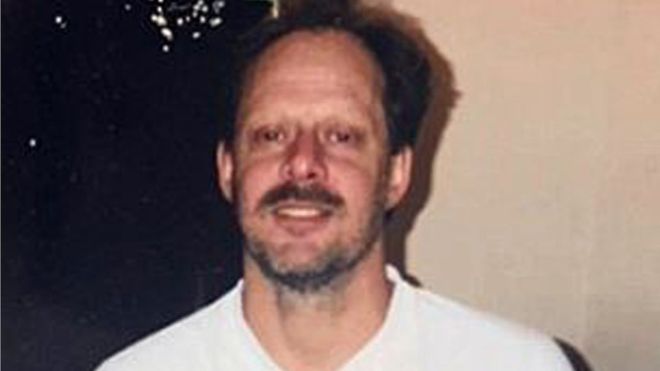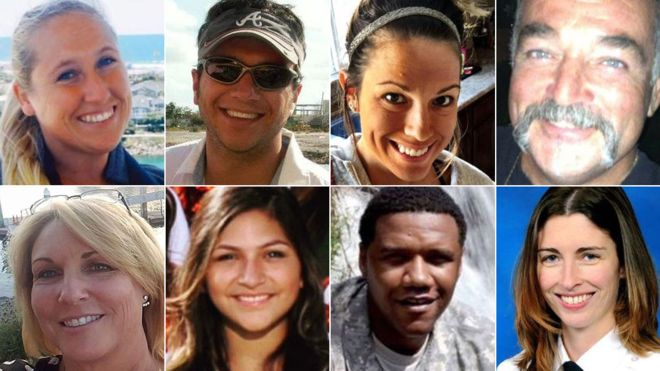Las Vegas shooting: Everything you need to know
Hi Zoe here, I’m the BBC journalist working on the Las Vegas story. I’m keeping across the latest videos, updates and what’s being talked about on social media.
Let me take you through the information we have. You can watch video, expand text articles or skip to areas that interest you.
On Sunday night, a gunman opened fire on concertgoers in Las Vegas, killing 58 people and injuring more than 500.
This is how the horror unfolded:
The gunman fired down on the crowd from a room on the 32nd floor of the Mandalay Hotel for 10 minutes.
This is the moment a police SWAT team closed in:
The gunman shot himself before police could apprehend him.

One of the big debates on social media right now is why Stephen Paddock isn't being described as a terrorist by officials and media organisations - including the BBC.
Read the different arguments (110 words)As details emerge about the Las Vegas gunman who killed at least 58 people and injured more than 500 others, an online debate has begun about why Stephen Paddock has not been labelled a terrorist.
Instead the 64-year-old who opened fire from the 32nd floor of the Mandalay Bay Hotel towards an open-air music festival on Sunday evening has been described by news outlets as a "lone wolf", a "granddad", a "gambler", and a "former accountant", but not a terrorist.
We do not know yet what motivated Paddock to carry out the deadly attack. There has been no link found to international terrorism and no confirmation of mental illness.
This was the scene inside Paddock’s room.

Another talking point is the a legal but controversial device that enabled Paddock to fire hundreds of rounds per minute.
They’re known as bump-stocks and were found on 12 out of the 23 guns found in his hotel room.
Read how bump-stocks work (100 words)Police say that the gunman who killed almost 60 people at a concert in Las Vegas had outfitted a legal but controversial accessory onto 12 of his semi-automatic rifles to enable them to fire hundreds of rounds per minute.
Officials say that theses devices - known as bump-stocks - have been found along with 23 guns inside Stephen Paddock's room at the Mandalay Bay Resort and Casino.
Bump-stocks, or slide fire adapters, allow semi-automatic rifles to fire at a high rate, similar to a machine gun, but can be obtained without the extensive background checks required of purchasing automatic weapons.
More details have been emerging about the 58 victims. They included military veterans, nurses and teachers.
 Read some of the relatives’ tributes (100 words)
Read some of the relatives’ tributes (100 words)
Details are emerging of the 58 people a gunman killed when he opened fire on innocent concert-goers in Las Vegas on Sunday night. They included a war veteran, a nurse and teachers.
Chris Roybal, 28, was a US Navy veteran from southern California who had recently returned from Afghanistan. In his last public Facebook post, back in July, he described what is was like to be shot at, and spoke of the feelings of anger engendered by conflict. His friend and fellow navy colleague Matthew Austin wrote on Facebook: "It breaks my heart and infuriates me that a veteran can come home from war unharmed and events like these occur."
President Trump was straight on Twitter that night:
My warmest condolences and sympathies to the victims and families of the terrible Las Vegas shooting. God bless you!
— Donald J. Trump (@realDonaldTrump) 2 October 2017
Later he described the massacre as “a pure act of evil’
It’s the worst mass shooting in US modern history.
We’ve analysed the data for you from the last three decades to explain how the US got to this point:
The right to bear arms is enshrined in the second amendment of the US constitution. But our correspondent explains the 5 key reasons US gun control laws won’t change any time soon.
 Read more about this (125 words)
Read more about this (125 words)
In the wake of the mass shooting in Las Vegas, gun control advocates are renewing calls for tightening regulation on firearms.
If the story sounds familiar, it's because a similar dynamic has played out time and time again in recent years, after every new gut-wrenching incident of gun violence makes headlines.
On the federal level, at least, the interest and attention in new legislation has led to almost no action in decades, despite numerous polls showing widespread public support for measures like strengthened background checks and banning certain types of high-capacity gun magazines and military-style assault rifles.
With such a high death toll this time, perhaps the pressure for change will be greater. Here are five big obstacles that stand in the way.